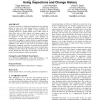Free Online Productivity Tools
i2Speak
i2Symbol
i2OCR
iTex2Img
iWeb2Print
iWeb2Shot
i2Type
iPdf2Split
iPdf2Merge
i2Bopomofo
i2Arabic
i2Style
i2Image
i2PDF
iLatex2Rtf
Sci2ools
ISESE
2006
IEEE
2006
IEEE
Identifying domain-specific defect classes using inspections and change history
We present an iterative, reading-based methodology for analyzing defects in source code when change history is available. Our bottom-up approach can be applied to build knowledge of recurring defects in a specific domain, even if other sources of defect data such as defect reports and change requests are ble, incomplete or at the wrong level of abstraction for the purposes of the defect analysis. After defining the methodology, we present the results of an empirical study where our method was applied to analyze defects in parallel programs which use the MPI (Message Passing Interface) library to express parallelism. This library is often used in the domain of high performance computing, where there is much discussion but little empirical data about the frequency and severity of defect types. Preliminary results indicate the methodology is feasible and can provide insights into the nature of real defects. We present the results, derived hypothesis, and lessons learned. Categories and S...
| Added | 12 Jun 2010 |
| Updated | 12 Jun 2010 |
| Type | Conference |
| Year | 2006 |
| Where | ISESE |
| Authors | Taiga Nakamura, Lorin Hochstein, Victor R. Basili |
Comments (0)

